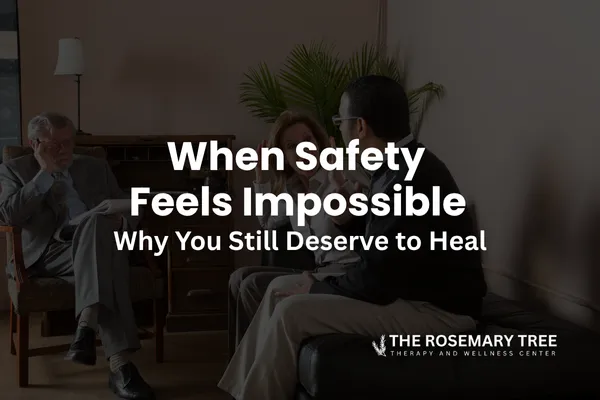
When Safety Feels Impossible: Why You Still Deserve to Heal
When You’re Tired of Trying
There comes a point in many relationships where both people are simply tired. The betrayed partner is exhausted from reliving the pain, and the partner who caused it feels hopeless about ever being trusted again.
You may find yourself saying, “What’s the point?” or “Maybe we’re just too damaged.” Those thoughts do not mean you have failed. They mean you are hurting. They mean you have been surviving for so long that your body and heart are asking for rest.
Even when safety feels impossible, healing can still happen. It just might look different from what you expected.
Why Safety Feels So Far Away
When betrayal or trauma shakes a relationship, the sense of safety disappears instantly. The nervous system interprets emotional pain as danger and goes into protection mode.
You may notice:
Difficulty trusting even small gestures
Constant worry or emotional distance
Feeling disconnected from your body
Numbness, exhaustion, or anger that will not fade
These are not signs that you are broken. They are signs that your system has been working overtime to protect you. Safety feels far away because your body does not yet believe it exists.
You Are Not Too Damaged to Heal
Many couples believe that if they were stronger, wiser, or more forgiving, things would already be better. The truth is, healing is not about being strong. It is about being supported.
There is no “too late” in healing. Even if trust has been shattered, or you feel numb toward your partner, or you have tried counseling before and it did not help, the capacity to heal remains. What often changes everything is not more effort, but the right kind of environment.
Why the Right Space Matters
Healing requires safety, and safety requires space.
Space to slow down.
Space to breathe.
Space to say what has not been said.
That is why our Accelerated Deep-Work Therapy Intensives were created. They give couples a structured, compassionate setting where real conversations can finally unfold.
During an intensive, couples are guided through:
Understanding what went wrong without blame
Releasing guilt and fear that keep them disconnected
Learning tools to regulate emotions and rebuild calm
Practicing communication that restores honesty and respect
The extended time allows for breakthroughs that rarely happen in traditional weekly sessions. Couples leave with new language for connection, a shared plan for safety, and often, for the first time in months, hope.
What Hope Looks Like
Hope after a crisis does not appear in grand gestures. It shows up quietly:
In the first calm conversation after months of tension
In a moment of laughter that does not feel forced
In an honest apology that lands softly instead of defensively
In one person saying, “I still want to try”
These small signs are not just progress, they are proof that healing is still alive between you.
If You Feel Like You Can’t Anymore
If you have reached the point where you feel too tired to keep going, that is okay. Sometimes healing begins in the decision to stop forcing things and simply seek help.
You do not have to know what comes next. You only need to be willing to take one gentle step toward safety, for yourself, for your partner, or even just to find peace within the uncertainty.
Even when you cannot see the path forward, it still exists.
Final Thoughts
When safety feels impossible, remember that feeling is not the truth, it is a signal that you have been surviving alone for too long. Healing happens in safe connection, not isolation.
If you are ready to explore what safety and healing could look like again, we would love to walk beside you. You can reach out to us here, and someone from our team will connect with you to talk through what this process might look like. There is no pressure, only care and support for wherever you are right now.


